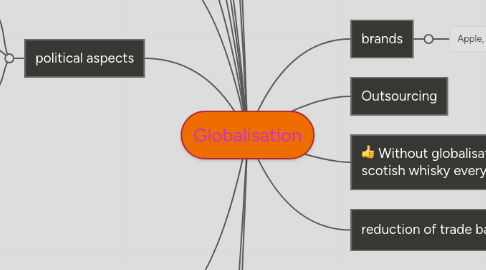
1. Accountability
2. Cultural aspects
2.1. negative
2.1.1. low wages for the workers in third world countries
2.1.2. exploit of workers in third world countries
2.1.3. cultural degradation
2.1.4. cultures differ from each other less
2.1.5. national cultures are under threat thanks to the spread of international media networks
2.2. positive
2.2.1. mixed cultures all over the world
2.2.2. better understanding for other cultures
2.2.3. democrazy spreads all over the world
2.2.4. increased respect for human rights
2.2.5. spreading of information
2.2.6. entertainment (music, movies,..) spread all over the world
2.2.7. use of english as international lingua franca across the world. Working language/official language of international organisations such as the United Nations, European Union, ...
3. equality/inequality
4. communication
5. recognition
6. What does Globalisation to our earth?
7. relocate production sites
8. political aspects
8.1. spread of democracy
8.2. reduction of trade barriers
8.3. as people improve the living conditions through an improved economy they become more educated and seek more political rights as well
9. History + Reasons
9.1. The concept stretches beck to the trading empires built by Spain, Portugal, Britain and Holland.
9.2. 100 years ago the world was as globalised as today
9.3. The 1930s depression put paid to that
9.4. General agreement on traffis and trade (GATT 1947)
9.5. The term "globalisation" was first coined in the 1980s.
9.6. World trade organisation (WTO 1995)
9.7. The past 40 years have seen the biggest and longest economic boom
9.8. The creation of the EEC, which is today the EU, is also part of the globalisation process
10. trade + economy
10.1. +
10.1.1. increased international trade market
10.1.2. growth in international travel
10.1.3. creates working places for many people
10.1.4. products from other countries are easily accessible
10.1.5. companies have to get more creative to compete with products from other countries
10.1.6. economy becomes better in many countries
10.1.7. reduction of trade barriers
10.1.8. trade between countries has become easier
10.1.9. products have become cheaper and available all over the world
10.2. -
10.2.1. product diversity may plunge because there are already better versions
10.2.2. poor working conditions
10.2.3. many smaller companies cannot compete on the global market
11. social aspects
11.1. relocation of production sites
11.2. horrendously long work hours
11.3. people are exploited as cheap labour
12. brands
12.1. Apple, McDonalds, Adidas, Nike, ...
12.1.1. If you travel to another country, you can buy products and import them into your country
